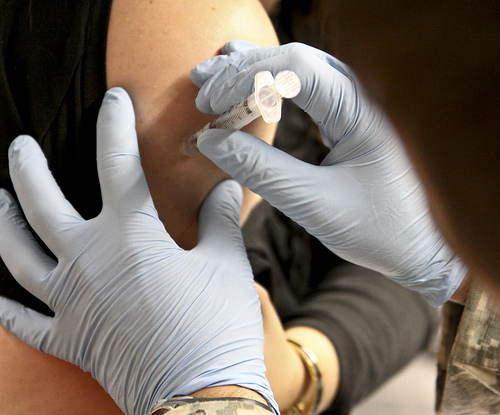
What is cervical cancer?
Cervical cancer occurs when abnormal cells in the cervix grow out of control. The cervix is the lower part of the uterus that opens into the vagina. Cervical cancer can often be successfully treated when it's found early ? or even better ? in its pre-invasive stage. There is a simple test to look for these abnormal cells: the Pap smear test.
If the test results show a minor abnormality, you may need a repeat Pap test. Your doctor may schedule a colposcopy ? an exam with a lit magnifying device ? or biopsy to get a better look at any changes that might have occurred in the cervical tissue. If abnormal cells are precancerous, they can then be removed or destroyed. Treatments are highly successful in preventing precancerous cells from developing into cancer.
Is cervical cancer frequent?
Worldwide, cervical cancer is the second most common and the fifth deadliest cancer among women. It affects about 16 in 100,000 women annually, and kills around 9 in 100,000. Approximately 80 percent of cervical cancers occur in developing countries. In 2008, it was estimated that there were 473,000 cases of cervical cancer and 253,500 deaths per year worldwide. This cancer affects even young women, with a median age of 42 years.

What causes cervical cancer?
Most cervical cancers are caused by a virus called human papillomavirus, or HPV. You can get HPV by having sexual contact. There are many types of HPV; not all cause cervical cancer. Some of them cause genital warts, but other types may not cause any symptoms at all.
You can have HPV for years and not know it. It stays in your body and can lead to cervical cancer years after you were infected. This is why it?s important to have regular Pap tests. A Pap test can find changes in cervical cells before they turn into cancer. If you treat these cell changes, you may prevent cervical cancer.
What are the symptoms?
Cervical cancer may not show any symptoms until the advanced stages. There are no specific symptoms to cervival cancer, but they may include abnormal bleeding, contact bleeding (after sexual intercourse), and vaginal discharge tinged with blood. Pelvic pain is extremely rare.
How is cervical cancer diagnosed?
As part of your regular pelvic exam, you should have a Pap test. During a Pap test, the doctor scrapes a small sample of cells from the surface of the cervix to look for changes. If a Pap test shows abnormal cell changes, your doctor may do other tests to look for pre-cancerous or cancerous cells in your cervix, such as a biopsy.
How is it treated?
Treatment depends on the stage of the cancer. The pre-cancerous stages and very early invasive stages need only minor surgery (leep excision), which conserves fertility and heals the patient 100 percent.
But things can become disastrous very quickly, since the five-year survival rates decrease rapidly. Surgery, such as an enlarged hysterectomy and removal of the pelvic lymph nodes with or without removal of both ovaries, are usually indicated. Chemotherapy and radiation therapy may complete the treatment.

Can cervical cancer be prevented?
The Pap test is the best way to find cervical cell changes that can lead to cervical cancer. Regular Pap tests almost always show these cell changes before they turn into cancer. It's important to follow up with your doctor after any abnormal Pap test result, so that any abnormal cell changes can be treated. This will prevent you from developing cervical cancer.
The virus that causes cervical cancer is spread through sexual contact. However, condoms cannot protect you against contamination since this virus is so minute that there is no mechanical way to guard against it. Condoms, on the other hand, are very helpful in preventing sexually-transmitted infections. Limiting the number of sexual partners is also a way of practicing safer sex.
Now, women can get the HPV vaccine, which is recommended for all girls and young women who have yet to have sexual intercourse or have only experienced a few contacts. This vaccine protects against two types of HPV that cause cervical cancer. However, regular Pap tests are still required.
Vaccines to prevent cervical cancer
Vaccines are now available to ward off the two types of HPV most strongly linked to cervical cancer. Both Cervarix and Gardasil require three doses over a six-month period. Studies suggest the vaccines are effective at preventing chronic infections with the two types of HPV that cause 70 percent of cervical cancers. Gardasil also protects against two types of HPV that cause genital warts.
Dr. Stefan Schneyer is head of the OB/GYN department at OASIS Healthcare. Born in Bavaria, Germany, Dr. Schneyer received his medical degree from Maximillian University in Wurzburg. He completed his internship and residency in France and Germany, and his post-graduate degree in Strasbourg, France. Dr. Schneyer speaks fluent English, German, and French. His specialties include incontinence surgery and pelvic floor disorder surgery.?
Photos (in order of appearance):?euthman via Flickr, Courtesy of OASIS, and USACE Europe District via Flickr
donovan mcnabb donovan mcnabb lottery ticket megga millions what is autism the giver march 30
কোন মন্তব্য নেই:
একটি মন্তব্য পোস্ট করুন